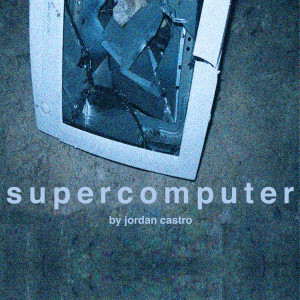Bio: Jordan Castro (b. 1992) is the author of Supercomputer (Deckfight Press, 2011) and two other e-books. He is the co-author of Cute (Thumbscrews Press, 2011) and two other chapbooks. He maintains a blog and a twitter account.
***
UF Review: Tell us a little about yourself. Who are you as a person?
Castro: My name is Jordan Castro. I currently live in Solon, OH with my two brothers, mom, dad and, ~65% of the time, Mallory Whitten.
The question “Who are you as a person?” reminds me of a conversation I had with a friend a few weeks ago about how we both felt “unable,” to some degree, to answer the question “Are you a vegan?”
These types of questions imply a sort of permanence of being that I feel uncomfortable with. I think everything is changing all the time, and to “resist” or “go against” this change, via questions like these or thinking in terms like these, intentionally or unintentionally, can result in pain/suffering, “confusion” and [other things], due to miscommunication being “almost unavoidable,” I feel. The answer to the question “Are you a vegan?” – if one is not, at the time of the question, eating meat – is objectively “Yes, I am currently a vegan.” But this isn’t what most people “mean,” I feel, when asking “Are you a vegan?” If the question was “What are your current thoughts about eating meat?” or “Did you eat meat today?” or [other concrete-reality based question], the person answering the question could respond with a “clearer” answer, in terms of “things assumed” vs “things explained,” or “abstractions” vs “concrete reality,” I feel, than if the person asked “Are you a vegan?”
I think focusing on interacting in a manner like this (“clearer,” “more literal”) can, in the long run, decrease confusion, miscommunication and, as a result, pain and suffering, both emotional and physical, I think, and those are all goals of mine, most of the time, I think.
UF Review: That’s a really smart answer. So when you write, what do you want to achieve?
Castro: Thank you.
In terms of Supercomputer, I think my goals included “having fun,” “writing something artistically satisfying, to me” and “conveying things in a manner I felt was as clear and concise as possible, while still maintaining narrative flow and consistency of tone/style.”
In terms of writing in general, my goals usually include [aforementioned goals] and other goals, depending on what I’m working on.
UF Review: Why are you called to write in the first place? Do you know?
Castro: I don’t know.
I think I like writing because I’m weird and writing seems to be a good medium for exploring, exposing and, sometimes, embracing that weirdness.
I also like that another weird person can write something about their weirdness, regardless of their age, physical appearance or [other thing that may or may not prevent us from “connecting” via a medium other than writing, if said writing didn’t exist], and other people can “connect” with it in a non-obligatory, potentially “less awkward,” or something, manner than via conversation, or some other means of communicating/”connecting.”
UF Review: You’ve already mentioned Supercomputer, and it’s getting a lot of attention. How would you describe the book?
Castro: Supercomputer is an e-book which contains four stories, written in similar styles, “about” things like working at a pizza shop, being in the library, buying drugs, drinking alcohol, having sex, listening to music, having a head cold, working on things, watching basketball and other things.
UF Review: Does Supercomputer speak in some way, then, to your other writing?
Castro: I think everything I write is “exactly the same as” and “completely different” than all of my other writing.
It’s the same because I wrote it and it’s the result of a certain combination of a certain series of circumstances, and it’s different because the certain combination of a certain series of circumstances are always different.
I think everything I’ve written so far has had protagonists who, I think, “feel alienated,” to a large degree, from their surroundings. I also think that I tend to write “about myself,” to a large degree, or begin my thought process re “what I’m going to write or am writing” with a thought about something in terms of myself, and so therefore tend to write about people in less of an abstract manner and more of a “realistic,” in my view, manner, or something, to me.
Everything in my previous answer, I’m “realizing” now, are “normal people” things to do, and it’s also a list of things I think certain literary critics or people might look at and say “This is boring” or “What is the point of this?” I think something in common with all of my writing is that the answer to the question “What is the point of this?” is “This.”
UF Review: What motivated you to release Supercomputer with an online independent press?
Castro: I liked being able to communicate closely with the editor, having “the final say” re “creative control,” the book being available for free, not “wasting” trees or resources to print, and that Josh seemed(s) into helping promote it.
UF Review: Elsewhere, you’ve been compared to Tao Lin, a name that brings all sorts of connotations to the table. Depending on what side of the table you’re sitting on, these connotations are either good or bad. Do you like being compared to someone else? Do you dislike it? Is it unfair? Is it an honor?
Castro: I don’t care about being compared to someone else, I think. If a person reads something and connects it with something else in his or her brain, that is not something I feel able to or want to control. I think, “if anything,” I like when my writing is compared to Tao’s because I like Tao’s writing and one of my goals is to write things I like reading.
I think, when this comparison is made in an attempt to “dismiss” me or my writing, that that is “unfair,” to some degree, due to our writing being, in my view, “extremely different,” in various regards.
I also think that since Tao and I are now what I view as “good friends,” it would make since if our future publications are similar, to some degree, as a result of spending a lot of time interacting. I don’t think I view it as “Tao ‘rubbing off’ on me or me ‘rubbing off’ on Tao,” but rather “both of us, as individuals, ‘rubbing off’ on one another, because everything ‘rubs off’ on everything, or something, especially the things that interact more frequently,” or something.
UF Review: Do you write with an audience in mind or do you write for yourself?
Castro: I think, ideally, I’d write “for myself,” but I don’t think I necessarily do. The context I think about while writing is usually “strongly centered” around me, but invariably, I think, I think about the people who may or may not read it in the future. To what degree this affects the “final outcome” of a piece, I can’t say.
UF Review: What are you currently reading? How is it?
Castro: “Good Morning, Midnight” by Jean Rhys. I’m reading it for the second time in a row (my first time being the time before this time) and I like it.
UF Review: Out of everything you’ve read, what book would you be most scared to live within?
Castro: I don’t think I’d feel scared to live in any book. Someone, I think Fernando Pessoa in The Book of Disquiet, wrote something like “Life’s a book that’s already been written” and I like that. I think, with this view, life “already is” a book, to some degree – every book, maybe – with a beginning, middle and end. The quality of the book, how much a person ”thinks about” the book, etc. are all the decision of the person reading it. The objective content, however, is not.
UF Review: So what’s next?
Castro: “Thumbscrews Press” recently released Cute, a chapbook of poetry and illustrations by Mallory Whitten and me that is available to purchase at my blog. I am “starring” as Tao Lin in the film adaption of “Shoplifting From American Apparel” by Tao Lin, which is now on Kickstarter. I also have a full-length poetry book coming out from “Black Coffee Press” in 2013 titled if i really wanted to feel happy, i’d feel happy already.
UF Review: Please share anything else you would like to say.
Castro: Thank you.





very interesting interview. I enjoyed it. thanks